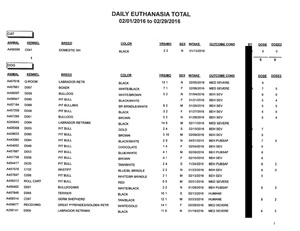 (click on image to see .pdf file) (click on image to see .pdf file) In late 2014, the City of Huntsville said that it had not destroyed any healthy or treatable dogs since October. We were thrilled and we took that news at face value. As part of our ongoing requests for public records, we began seeking (and still seek) monthly reports regarding the dogs destroyed at the shelter. Our analysis of those records revealed that all was not as it seemed. While we would have expected that the vast majority of dogs destroyed would have been destroyed to alleviate suffering or due to some serious medical conditions, the vast majority of dogs were being destroyed for a variety of issues related to behavior. We were surprised by this. We know that some dogs cannot be saved and genuinely do pose a public safety risk. Ordinarily, however, those dogs are in the low single percentages of overall shelter intake. In our case, approximately 80% of the dogs destroyed each month were being destroyed due to behavior. In October of 2014, 32 dogs were destroyed for behavioral issues. In January of 2015, that number rose to 50 dogs. In August of 2015, 25 dogs were destroyed for behavior. Even experts regarding the behavior of dogs in a shelter environment will agree that evaluating dogs in shelter is an imperfect process. A report from the National Canine Research Council concludes that, "shelter evaluations may tell us as much or more about the effect of the shelter as they do about the individual dogs. Shelters are noisy, alien environments, filled with strange smells, unfamiliar people, and dogs they may hear, but not see. We should not be surprised that some dogs may. . . behave differently when confined in a shelter, with its barrage of stressors that the dog cannot control, than they will in the safe, secure, predictable environment of a home, cared for by people with whom they are able to form positive attachments." In March of 2015, we expressed our concerns to the city and recommended that help be sought regarding how to properly and consistently evaluate dogs. We felt something was not right and we had two main concerns: 1) that otherwise good dogs who were just scared or traumatized were not being given a full and fair opportunity to be saved; and 2) that potentially dangerous dogs were making it out of the shelter to rescue groups and into adoptive and foster homes, creating a public safety risk. Our recommendation to the city was that it seek help from people who could train the staff on how to evaluate dogs. We specifically recommended that the city engage with representatives from Humane Network and with Kelley Bollen from the Animal Welfare Alliances in Massachusetts (and the former Director of Behavior Programs for the Shelter Medicine Program at Cornell University College of Veterinary Medicine). We are pleased to report that on March 22 and 23, 2016, Humane Network CEO Diane Blankenburg and Kelley Bollen were in Huntsville to provide two solid days of training and guidance to members of the shelter staff, county animal control officials, rescuers and volunteers. Members of our coalition were also invited to attend. We found the training and presentations not only incredibly informative, but were very pleased with the level of enthusiasm expressed by the shelter staff and how engaged they were in the training. There is a delicate balancing act for any animal shelter when it comes to ensuring public safety while striving to save the lives of healthy and treatable animals. It is our genuine hope that city officials, city employees, rescuers and shelter volunteers feel empowered by the training provided last week. We can all agree that dogs who are genuinely dangerous do not belong out in our community. We think it is likely that in any given month, only a small number of dogs who enter our shelter actually fit that category. We can also likely agree that a lot of dogs who end up in our shelter are just scared, confused or traumatized in some way and they deserve the very best opportunity to be reunited with their families or placed with new families through reliable evaluation methods. If your dog ended up in a shelter, how would he or she react? We are hopeful more dogs than ever will be saved moving forward using this new training and established procedures which set dogs up for success.
0 Comments
|
No Kill Huntsville
Keep up with our updates and latest news regarding Huntsville becoming a no kill community. Archives
January 2022
Categories
All
image courtesy of Terrah Johnson
|

 RSS Feed
RSS Feed
